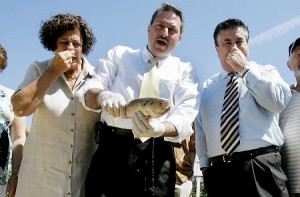AN ARTICLE in a recent issue of The Wanderer resurrected the old accusation, often heard in the 1960s and 1970s, that ICEL (the International Committee for English in the Liturgy), bore almost exclusive responsibility for the post-Vatican II mistranslations of the Mass of Paul VI. English-speaking Catholics, we were repeatedly told, never had the opportunity to assist at the real Mass of Paul VI, because the wicked modernists in ICEL had manipulated the English translation in such a way as to undermine what our beloved Holy Father had intended for the new rite.
The following is a letter to the Editor that I wrote in response to the article.
* * * * *
Paul Likoudis’s “Liturgy Wars are Over” (The Wanderer, September 16, 2010, p. 4) brought back memories of the anger and outrage we conservatives felt during the ‘60s and ‘70s when ICEL shoved their mistranslations and kindergarten style down the throats of the English-speaking Catholics everywhere. Their work was a particular trial for those of us church musicians who still believed in maintaining a sacred style for music at Catholic worship.
Mr. Likoudis, however, leaves the impression that blame for those mistranslations is to be laid almost exclusively at the feet of ICEL. Most of us certainly believed this during those years after the Council, and we undertook various initiatives to bring the problem to the attention of those who would surely correct it — “If the Pope only knew about this deception,” etc. etc.
However, now that so much documentation about the history of the liturgical reform has become readily available, and so many members of Consilium have written their own accounts about their work, it is clear that ICEL was merely putting into practice principles enunciated in various Roman documents.
Three documents from Consilium (Inter Oecumenici, 1964; “Conventus de Popularibus Interpretationibus Textuum Liturgicorum,” 1965; Aussitôt après, 1967) progressively allowed translators more and more freedom to “adapt” translations.
The final blow to any pretense of accuracy came with the Roman Instruction Comme le Prévoit (25 January 1969). This document (denounced several years ago in The Wanderer, if memory serves) laid down the general principles that would produce the distortions, omissions and outright errors we conservatives complained about in the ICEL translations.
Its probably author, Father Antoine Dumas, wrote a commentary on Comme le Prévoit the following year. (Notitiae 6, 194-213) Here, he amplified the principles laid down in such a way as to further the modernist theological agenda of removing from translations “negative” theology and allusions to doctrines that Protestants could find offensive. (Thus “victim” would disappear from the translation of the Eucharistic Prayer 1.)
Nor, it appears, could one maintain that ICEL and Consilium were operating a cabal (as some of us thought) “to frustrate the will of the Holy Father.”
The real blame, it turns out, rested with Paul VI himself. He carefully examined both the French and Italian drafts of Comme le prévoit; he made 47 notations on the draft in his own handwriting; he made changes both in its style and substance, and he even corrected the printer’s page-proofs. (See Bugnini, La Riforma, 236-7)
So, the awful ICEL mistranslations, it seems, were nothing more than an implementation of official policy handed down from the top.
* * * * *
Readers can find a more detailed discussion of this issue, including citations, in Chapter 4 of Work of Human Hands.
So, ICEL should not be made the whipping boy for the awful post-Vatican II mistranslations. Ultimately Paul VI laid down the principles that ICEL followed.
If the translations stank, it was because (as the Italians say) Il pesce puzza dalla testa — the fish rots from the head.

8 Comments